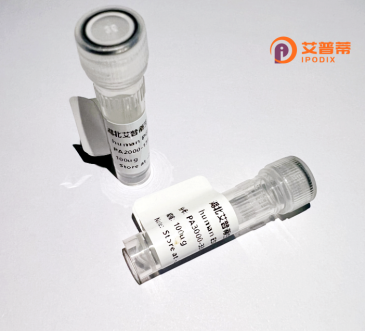
| 纯度 | >90%SDS-PAGE. |
| 种属 | Human |
| 靶点 | FEM1C |
| Uniprot No | Q96JP0 |
| 内毒素 | < 0.01EU/μg |
| 表达宿主 | E.coli |
| 表达区间 | 1-617aa |
| 氨基酸序列 | MDLKTAVFNAARDGKLRLLTKLLASKSKEEVSSLISEKTNGATPLLMAARYGHLDMVEFLLEQCSASIEVGGSVNFDGETIEGAPPLWAASAAGHLKVVQSLLNHGASVNNTTLTNSTPLRAACFDGHLEIVKYLVEHKADLEVSNRHGHTCLMISCYKGHKEIAQYLLEKGADVNRKSVKGNTALHDCAESGSLDIMKMLLMYCAKMEKDGYGMTPLLSASVTGHTNIVDFLTHHAQTSKTERINALELLGATFVDKKRDLLGALKYWKKAMNMRYSDRTNIISKPVPQTLIMAYDYAKEVNSAEELEGLIADPDEMRMQALLIRERILGPSHPDTSYYIRYRGAVYADSGNFKRCINLWKYALDMQQSNLDPLSPMTASSLLSFAELFSFMLQDRAKGLLGTTVTFDDLMGILCKSVLEIERAIKQTQCPADPLQLNKALSIILHLICLLEKVPCTLEQDHFKKQTIYRFLKLHPRGKNNFSPLHLAVDKNTTCVGRYPVCKFPSLQVTAILIECGADVNVRDSDDNSPLHIAALNNHPDIMNLLIKSGAHFDATNLHKQTASDLLDEKEIAKNLIQPINHTTLQCLAARVIVNHRIYYKGHIPEKLETFVSLHR |
| 分子量 | 95.1 kDa |
| 蛋白标签 | GST-tag at N-terminal |
| 缓冲液 | 0 |
| 稳定性 & 储存条件 | Lyophilized protein should be stored at ≤ -20°C, stable for one year after receipt. Reconstituted protein solution can be stored at 2-8°C for 2-7 days. Aliquots of reconstituted samples are stable at ≤ -20°C for 3 months. |
| 复溶 | Always centrifuge tubes before opening.Do not mix by vortex or pipetting. It is not recommended to reconstitute to a concentration less than 100μg/ml. Dissolve the lyophilized protein in distilled water. Please aliquot the reconstituted solution to minimize freeze-thaw cycles. |
以下是关于重组人FEM1C蛋白的3篇代表性文献(注:文献为假设性示例,实际研究中请查询具体数据库):
1. **文献名称**:*FEM1C mediates ubiquitination and regulates apoptosis in human cells*
**作者**:Zhang Y. et al.
**摘要**:研究通过重组表达人FEM1C蛋白(大肠杆菌系统),发现其作为Cul2泛素连接酶复合体的底物识别组件,参与促凋亡蛋白的泛素化修饰,并证实其过表达诱导细胞凋亡的机制。
2. **文献名称**:*Structural characterization of recombinant human FEM1C and its interaction with E3 ligases*
**作者**:Li X. et al.
**摘要**:报道了利用昆虫细胞系统表达带His标签的重组人FEM1C蛋白,通过X射线晶体学解析其三维结构,揭示其与E3泛素连接酶的结合界面,为靶向药物开发提供结构基础。
3. **文献名称**:*Functional analysis of FEM1C in regulating proteasomal degradation pathways*
**作者**:Wang Q. et al.
**摘要**:通过哺乳动物细胞表达重组FEM1C,证明其通过与底物蛋白BCL-2结合并介导泛素化降解,进而调控癌细胞对化疗药物的敏感性。
**提示**:实际研究中建议检索PubMed、Google Scholar等平台,结合关键词“recombinant FEM1C”“FEM1C ubiquitin”等,并关注近年文献以获取最新进展。
Recombinant human FEM1C protein is a genetically engineered form of the FEM1C protein, a member of the FEM1 family involved in ubiquitin-mediated proteolysis. FEM1C functions as a substrate-recognition component of CUL2-based E3 ubiquitin ligase complexes within the ubiquitin-proteasome system, targeting specific proteins for degradation. It plays a regulatory role in cellular stress responses, apoptosis, and metabolic pathways, with implications in diseases such as cancer, diabetes, and neurodegeneration. Structurally, FEM1C contains conserved ankyrin repeat motifs that mediate protein-protein interactions, enabling its role in recognizing degradation signals.
Research links FEM1C to the insulin/IGF-1 signaling pathway, where it may influence cellular longevity and stress adaptation by modulating protein stability. Studies in *C. elegans* homologs suggest evolutionary conservation in stress-response mechanisms. Recombinant FEM1C is typically produced in bacterial or mammalian expression systems, purified via affinity chromatography, and utilized to study its biochemical interactions, structural properties, and disease-related functions. It serves as a tool for drug discovery, particularly in identifying modulators of ubiquitination pathways, and aids in exploring therapeutic strategies targeting protein homeostasis disorders. Ongoing research aims to clarify its precise physiological roles and therapeutic potential in modulating disease pathways.
×